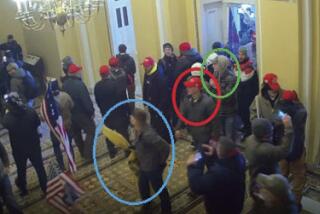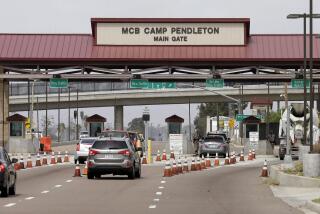Marines Drop Charges of Spying Against Bracy : Cite Insufficient Evidence Against Corporal Who Served as Guard at Embassy in Moscow
- Share via
QUANTICO, Va. — The Marine Corps, citing insufficient evidence, abruptly dropped all espionage charges Friday against Cpl. Arnold Bracy, a former security guard at the U.S. Embassy in Moscow who had been held in solitary confinement for nearly three months.
Lawyers for the 21-year-old Bracy charged that he had been a victim of coercion and “shabby and unethical” conduct by the Naval Investigative Service. But Bracy, heading home to Queens, N.Y., on a 10-day leave, said he hopes to stay in the military.
“I have no bad feelings toward the Marines Corps,” he said.
The decision to release Bracy from the brig at this Marine base south of Washington was another major setback for the military investigation and prosecution of what has been billed as a major sex-and-spy scandal involving guards at the nation’s most sensitive foreign diplomatic outpost.
Charges Against Lonetree
The Marine Corps last month pared back its charges against Sgt. Clayton J. Lonetree, who served with Bracy in Moscow, and freed another former security guard, Sgt. John J. Weirick, because the statute of limitations had expired on his alleged offenses.
Lt. Gen. Frank E. Petersen, the Quantico commander who dismissed the espionage and related charges against Bracy, said the prosecutor concluded there was “not sufficient evidence to corroborate” a statement Bracy gave military investigators in March admitting that he had assisted Lonetree in allowing Soviet agents into secure areas of the embassy.
Bracy later recanted that confession and, at a news conference after his release, said he had been coerced into signing the statement by NIS agents who “concocted the story.”
“They said I wouldn’t get a decent job or another meal” if he didn’t sign the statement, Bracy said of his interrogators.
Lt. Col. Michael Powell, Bracy’s chief military defense counsel, criticized the NIS for “shabby and unethical” conduct, charging that the agency improperly used lie-detector tests to coerce a confession from the Marine.
“We believe this was a willful and intentionally deceptive use of that technique,” Powell said. “It suggests abuse of the polygraph as an interrogation tool.”
Charles E. Carter of Baltimore, associate general counsel of the NAACP who joined Bracy’s defense team, also complained that the NIS took a “sloppy and biased approach” in its investigation.
‘The NIS Fouled Up’
“All it really had to go on was an allegation that Cpl. Bracy had been intimate with a Russian national,” Carter said. “This seemed to send the NIS off into a frenzy. . . . In military jargon, the NIS fouled up and fouled up badly.”
Carter also said that “the media, caught up in the hysteria of what they saw as a juicy sex scandal, had in effect already tried and convicted this young man.”
“In the minds of millions of people he was a treacherous Marine who had been taken in by the Russians and had betrayed his country,” Carter added. “This is a most damnable charge to level against anyone, but the media seemed more content to rush to judgment than to ferret out the truth.”
Denies Sexual Contact
At the news conference, Bracy denied he had had sexual contact with a Soviet woman, as the prosecution had charged.
He said the woman, who worked as a cook at the Moscow embassy, approached him last June and indirectly tried to recruit him as a spy. He said he rebuffed her and reported the contact to his superiors.
A few weeks later, he said, he went to the apartment of a diplomat where the woman was working as a baby sitter to tell her he was upset that the Soviets thought he would spy for them. “I told her to tell her Soviet buddies to take a walk,” he said.
But Bracy did not report that encounter to his commander, who later learned of it from others who also were at the apartment. “I made my mistake when I tried to act on my own,” he said. “My advice to other Marines is just use your chain of command.”
For that unreported contact with a Soviet citizen, Bracy was reduced in rank from sergeant to corporal and reassigned to the Marine base at Twentynine Palms, Calif., where he was serving as a mechanic when the NIS investigators questioned him in March.
Admissibility of Confessions
At that time, the Marines said in the statement Friday, “we had no information then that Bracy had himself been involved in espionage.” But Bracy “confessed to a number of serious offenses . . . including espionage” and charges were formally lodged against him, the statement said. It added:
“Under the Uniform Code of Military Justice, as in civilian criminal law, confessions are not admissible as evidence unless there is independent evidence to corroborate them. Despite thorough investigation, the necessary corroborative evidence has not been developed.”
The statement said the NIS “investigation was conducted in a correct and professional manner.”
The Marines said more than 100 NIS agents have been assigned to the case. The investigation is continuing, the statement said, “and all investigative leads concerning Cpl. Bracy’s involvement or the involvement of others will continue to be pursued.”
Dismissal of the charges against Bracy will have no impact on the case against Lonetree, the Marines said. He is scheduled to be tried in a court-martial July 22 on charges that he passed classified documents to the Soviets and identified American intelligence operatives.
But Michael V. Stuhff, one of Lonetree’s lawyers, said of the prosecution’s case: “We are seeing this house built on sand beginning to crumble.”
More to Read
Sign up for Essential California
The most important California stories and recommendations in your inbox every morning.
You may occasionally receive promotional content from the Los Angeles Times.













